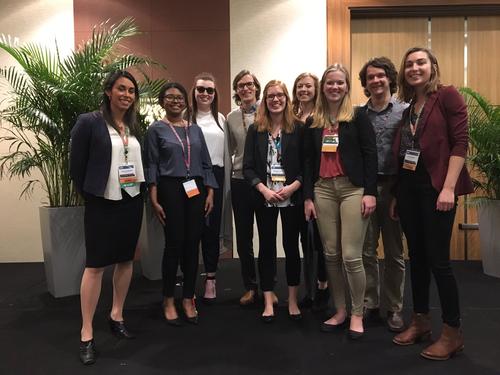Contributions by Leah Wouda and Grace Wright
Each year, Mennonite Economic Development Associates (MEDA), a non-profit organization focused on using business and entrepreneurship as a tool to alleviate poverty, hosts a convention to engage its supporters. This year’s convention, held in Indianapolis, IN, included a stream of activities that brought together young professionals and students to connect with innovators and entrepreneurs.

New to the convention this November was MEDAx, a conference-within-the-conference that culminated in a $5K pitch competition to foster innovation for emerging social entrepreneurs. MEDA received applications from across the United States and Canada for the pitch competition and selected four finalists who, notably, all hailed from Waterloo Region.
This year, two of the four finalists were connected to the Kindred Credit Union Centre for Peace Advancement (CPA)—the Grebel team and SheLeads founder and Epp Peace Incubator participant, Cassie Myers. Throughout the process, the CPA acted as a valued resource for both.
CPA Director Paul Heidebrecht helped select this year’s Grebel team, and offered guidance and coaching as they developed both the social mission and business aspects of their idea. “Paul was a constant resource for us if we needed him, and was a great support to have in helping us find connections and narrow down the problem,” noted Wouda.
“Although we did not win the competition,” Wouda added, “we were so excited about the opportunity to pitch, and received an incredible amount of positive feedback about our idea. MEDAx complimented the other aspects of convention very well, while also providing a space for younger adults to learn more about leadership, business development, and innovation.”
The Grebel team pitched an idea for a product called SheCycle, a reusable sanitary pad for women in Uganda that is made from local resources, is environmentally sustainable, safe for women to use, and prevents infections. Distributed with educational resources and sold in markets, the pad would help improve women’s health through a market-based solution.
“The MEDA reach of supporters is much larger than I originally thought, with support coming from across North America, as well as across the world,” reflected Wouda. “It was exciting to be a part of a community that supported and challenged each other, and welcomed newcomers like myself with open arms. One of the most hopeful things I saw was a curiosity in each person. Each person that I spoke with asked me about myself and what brought me to MEDA, and they were equally willing to share about their experiences. These stories are what brought MEDA to life for me as an excellent example of a sustainable community.”